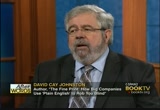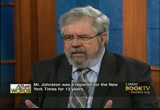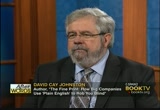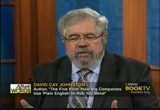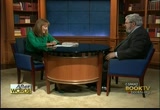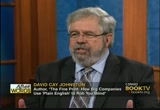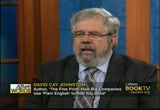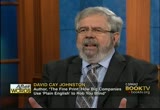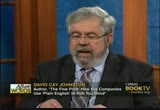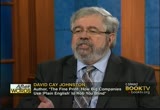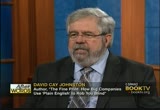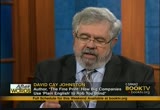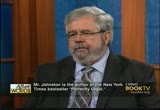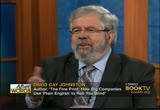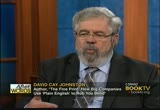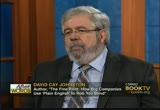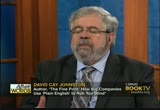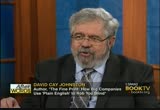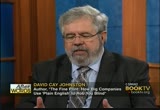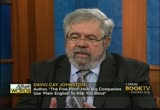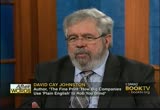tv Book TV After Words CSPAN November 18, 2012 11:00am-12:00pm EST
11:00 am
it. people often say to reporters like you and i that you're just doing, these are the worst-case examples but it's not as bad as you describe. i bet there are probably more examples. did you have trouble filling this book? >> guest: i have enough winter i could do another book and maybe two more books on the same thing about what's going on. unfortunately we need to keep in mind what adam smith taught when he wrote "the wealth of nations" in 1776. seldom to businessmen gathered together even for merriment of the talk goes to conversation against the public interest to raise prices and lower wages. and what a document in "the fine print" is how a number of big corporations have tried to work the rigors of market competition, create monopolies, duopolies and oligopolies, artificially raise prices, provide very core poor service compared to some interest in other countries of the world. and in a few cases put lives at
11:01 am
risk. and how we don't have a balanced system focus on competitive markets. >> host: is there can we'll go through some of this specific examples and a think everybody who talks she probably has their favorites here but to you, what was the most egregious? what stands out to you as being the most egregious and tell us a bit about it. >> guest: the most single agreed to star in the book is about a man named rob manning. bob manning was a 26 year-old lineman for the electric power company in upstate new york, niagara mohawk. and one day in february 1962, as he was coming down off a powerful, able to electricity got loose and he went headfirst into the pen, paralyzed from the neck down. i met bob in 1997 when he called the new york times looking for help because he couldn't collect his workers compensation benefits, 35 years later. but that's not the egregious story i tell in this book.
11:02 am
the really egregious story is the power company was sold. the insurance company that had his claim which is owned by bunch of utilities was been sold, and they had a finding that a window case of refusal to pay benefits for the nuke state insurance department. i called him about that and i said did you not read the front-page of the new times? did you not read what governor pataki said? they said we don't pay attention to what's in his perfect i said what about all the complaints by this man? they said but he never got a final ruling that they never paid in the so he can't walk. they did ultimately some of the money he was owed. and in the insurance policy was bought by a warren buffett company. and a nurse comes around the gratian herself into bob manning slides in california where he moved, and eventually she goes to his home which they have a right to due to inspect. and the manning's are these wonderful people who, they
11:03 am
adopted three children from the relative whose parents were killed, and marvelous human beings. this nurse goes into bob's room and points to the wall and system why don't you have a dnr? dnr means do not resuscitate. why are you having medics tried to keep you likely have one of your of emergencies which have us all the time, in effect asking him to die. bob's wife, bob, his nurse, his doctor, all the people who saw the nurse do this and/or other actions were just appalled by this. will, well, you know, warren buffett didn't know about this and wouldn't approve of italy's. but understand what does mr. buffett said about his company's? so long as my managers make their numbers, i let them run the bases that they see fit. and it's indicative of the callousness that is going on when we don't have balance and we are so focused on profit that we literally cannot a company go and say, please die.
11:04 am
>> host: but when we talk about in your book you talked a lot about some of these industries have been deregulated. often people think about regulation in terms of the democrat versus republican issue. but were more of these, or more of the problems created because of democrats are because of republicans, or is this not a party related issue? >> guest: there is one part in washington. it's the of money. there's one part in the state capital. it's the party of money but if you or i were elected to congress would have to be like every member cost of because if we want to get reelected which means that you listen to people who will provide the money to pay for the campaigns for us to run for office. it's not going to be joe sixpack and mary smith. it's going to be representatives of big corporations. and wealthy individuals who all, pleading, i just need a change here to be fair. what you really want to do is on level the playing field and force the rigors of the market.
11:05 am
there's no such thing as deregulation. there is only we regulation. there so many regulation. so we've done is taken regulation -- i'm not going to defend every revelation but we took a regulatory scheme that was balanced to look at the interest of companies and look at the interests of customers and other parties, and replaced with a system of the corporations by the corporations who takes away consumer rights. everything is regulated. baseball regulates right now coming pages are on the ball and what color. everything is regulated. and most of the regulations that are in the federal code of regulations in the state were sought by corporations. business seeks regulation both to define the playing field but more importantly to try and prevent competitors and escape the rigors of competitive market. >> host: writing the regulations. >> guest: many are written by the companies house of representatives people better believe that. ethnic but you having worked in
11:06 am
washington, houston. everyone who works there have seen that's what happens. >> host: everyone is in on it. >> guest: they have a lot less power than the corporations. >> host: less money. so you use a couple powerful phrase in the book, a rigged economy. you kind of touch on that but if you explain more clearly. >> guest: well, in a competitive market, government would set the rules, and as the germans do with what they call -- at just the rules as business figure out how to gain those rules to try to have a level playing field is possible. you will want to keep try to make sure the playing field is level because the market will figure out just how to allocate capital so you succeeded but it's also a natural tendency in a capitalist market to go towards monopoly or duopoly, where a couple very couple of successful firms get bigger and bigger and bigger, and removing competition.
11:07 am
when that happens what you get is, you want your monopoly or duopoly you don't want to invest in innovation but you don't want to take risks. you just want to mine the market, went sinking by which they mean earning profits greater than you would get in a market economy. when you add to that all of these rows and regulations in the book, and every chapter, i'm sure you read things, you have not read in the news media, i show how again and again and again the marketing rig. this is terrible for national economy and explain why we are in these economic doldrums and what we don't have job creation. >> host: let's go through some of the examples, they will touch on a few of my favorites and then get back to some of the ones you might stand out more for you other than that awful story of the bob manning. how about the internet? to have this right? we have the highest prices in the world and we are 29th in
11:08 am
speed? explain come how did that come to be? trachea we invented the internet in america. taxpayers, and set up by academics the military through what's now called darpa, the defense advanced research project agency. so begin at number one. and back in the '90s al gore as soon as vice president and others promote this idea that would have this wondrous thing called internet. when browsers came along in 1995, it meant the geeks were not the ones who could use an apple we all know today as the internet. the telephone companies, the cable companies, all went to capitol hill and state legislatures and said we're going to build his fibers thing. there was this great television and in 1999 were an old geezer, sort of like me by then, polls into this fleabag motel, drop secession assisted young woman behind the desk, rooms, king size beds, room service,
11:09 am
entertainment what she looks at him and says every movie ever made in every language in every room. that's a we are promised. this was shot at roy's café in the mojave desert to the rest of the world was doing that. the internet was being made universal all over the place to america raced 29th with a speed of its in it behind such leading industrial lights of the world as multi-and ukraine. moldavia and ukraine. we pay the highest price in will by far, by one measure with a 38 times what the japanese paid per bit of information. if you buy one of the trouble they package and i find my home, you pay on average with taxes and you $160. in france, uk $388 u.s. and you get worldwide calling to 70 countries, not just the u.s. and canada. you get worldwide television, not just domestic. and your internet is 20 times
11:10 am
faster is uploading and 10 times faster downloading, and your bank less than 25 cents on the dollar. all these other countries understand a fundamental principle. in the 19th century, canals and railroads were the key to economic growth as an desolation came along and you had to move heavy things like steel. as the 20 century came along, it was highways, interstate highway program, for example, an airport that were crucial to economic growth. now it's the information superhighway. and what distinguishes a? don't call it that anymore. the reason is the rest of was getting information superhighway -- >> host: to the delivery to you that? >> guest: [inaudible] at&t has fiber optic or not to your own prodigious runs down the street. but the companies are not wiring the whole country the way these other countries are. universal access of really high speed internet would lead to
11:11 am
products and services began in monday what you but if you few but they will come. that's what these other countries are doing the. we will be left in the dust economically. then these companies went to the state legislatures and i got all these changes in the law that i tell about that said you don't have to provide service to put. very few americans know since 1913 date that a legal right to a telephone at any address. five states have repealed that law. i think it is sort, alabama, texas, north carolina and wisconsin. i can't find a single newspaper clip telling ms. i called advocacy groups who do with people, things like lifeline access for disabled and poor people. they go what? we didn't have that. [talking over each other] one of the origins is made if we don't have monopoly anymore. with these competing services. there's cable company, telephone companies, cell phone comes. a cell phone is the equivalent of these other services. but under the rules they passed
11:12 am
in many places you could have a cable company and the phone company with cable of some kind, collapse or fiber optic running down your street them and refuse to serve you. if you live in apartment building with 100 years and only 40 people, we're not going to why you're building. if there's a building in north jersey that has not been wired for four years, that building has among its residents, the chief ratepayer advocate for the state of new jersey. when i wrote about that i thought, surely some executive at verizon will say, that's how about publicly smart to be. they will figure how to get these -- they didn't want them akin to it and they were told no, we don't negotiate. we'll punch holes would want to. they didn't do anything. that's how much power these companies have. if the chief ratepayer can't get fiber optic service what hope do you or i or anyone listing have as these laws are rewritten to take away your rights, invest all the power in the company and then cut out the state
11:13 am
regulators who were there to protect your. >> host: i want to get to this, but that particular example, what would you tell a consumer that is in a situation that i know you recommend people get more involved but what can you do? aspect this book has a lot of solutions. i was at the new times and at times was right solutions as to express of ice pick this book has lots of proposed solutions. all through these books in been the same since the reform begins with you. my job as a journalist is to dig yourself out of the record, do the investigative work that is needed, explain it to you so you can understand. it's your job to go do something about it or live with the consequences. >> host: if you're living in the building in new jersey, what would you do personally? >> guest: first of all of the complaint to the company if you or i could. i would go to the state legislature and say i'm certain with this nice beautiful
11:14 am
building, your position is they can punch holes with no regard for our property? no regard for property rights or we don't get service. i would make noise with the legislature and get their attention. most of the lawmakers to pass these things come both federal and state, have no idea what to do. they don't read the bills. they never have, they never will. and they do, their stances this is what this bill is about, and only a handful of people actually get in and learn what these things are about. if there's no pushback, if there are not consumer groups, government funded organizations are supposed to look out for the consumer, as well as private groups, then you get this one-sided development of the law that undoes each of the principal to in syracuse i teach that one day week and the law school, graduate school of business. and i teach the history of these things. property tax among class and business revelation in another. everything in the law today pretty much is holmer robbie's
11:15 am
code from social insurance to business regulation to rules on loans to defenses for white-collar crime. and these laws were developed from thousands of years of experience. what we are seeing now is these big corporations very quietly, nobody noticing, undoing thousands of years of human experience to their benefit and to the detriment of the overall economy. >> host: is very solution with the state legislature? should they be, year-round, should they be paid more? should lobbying restrictions be greater? >> guest: this is a real difficult problem. it strikes me, one of the solutions we should be having an active discussion about his public finance to the election the a two state senate tried this, maintainers and it turns out the incumbents tend to get thrown out which is kind of surprising. the constitution gives you a right to lobby. first amendment says a right to
11:16 am
petition for redress, does not require any response by the government. requires to accept the petition. i don't think a lobbying we're seeing in the state capitals in washington is what the founders had in mind. because it's a company with campaign contributions or the threat of combinations to other people if you don't play ball. they're the only people who really didn't hurt. so i think fundamental reform of a campaign contribution system would be important. in my last book "free lunch" i suggested that we should put in place a set of rules that once you're elected to office like this you can't go to work for the industries that you are uncommitted that we're involved with. maybe we should pay you a lifetime pension, sort of renew you from the economy. i suspect as costly as that might be a might be a lot cheaper than the things we're seeing now that are extracting billions and hundreds of billions of dollars in peoples pockets that a market would never allow, and given over to
11:17 am
these corporations. >> host: back to the telecom industry, the remote control, the process on the remote control is fascinating. could you go over that? what was the prophet? >> guest: it's off the wall. glasgow, kentucky, draws its name from scotland and, of course, the scots are famous for being very tight with the book. they had a monopoly provider who was charging incredible provided to if you had a clicker to change channels when you're sitting on the sofa, it was $5 a month. they built a municipal system. they were able to cut prices dramatically, still make money on the system. they cut the price of a remote to less than 1 dollar. even at 1 dollar they make tremendous money. you can go by a remote. if you look very carefully at your cable bill your nose like a lot in his line after line of details, to get you do not notice what's going on. you're probably paying 75 cents a month. they buy these things are a couple of dollars in fact they are worth nothing when you
11:18 am
return your cable box, they don't ask you to bring your clicker. so $5 a month is indicative of that is price gouging because charging a rate of return that is thousands of percent overtime. you can do that if you're a monopoly. to be a monopoly in most cases, especially an adult communicate and the government let you be a monopoly. >> host: the company and glasgow is still there? >> guest: yes. what happened was there was an effort by the company, the private company to sue them out of business. newt gingrich when he was speaker of the house and the 1996 telecommunications act was being debated, set up a group, progress and freedom foundation i think was the name. and he was raised money to promote what the telecom industry one. not what the public wanted to put the system and glasgow in the red. losing money. but only because the cost of litigation. when the case came before a
11:19 am
well-known real conservative judge, he listened to the industry lawyer, and he leaned down from the bench and said solar cells like you just don't want any competition. since then, glasgow has modernize its system twice. municipal system. it charges much lower rates than the surrounding monopoly provided the same thing as happened in lafayette, louisiana, and chattanooga just a facet internet in america. just as over 100 shares ago there were communities were wall street said we're not going to wire you for electricity. we're not going to do it. so the town and create their own municipal systems, and overall people get municipal electricity pay about one-third less. they have fewer outages, better service. and by the way, even the big systems like the "los angeles times" waterpower, sacramento, these big systems pay salaries to their top executives had earned six figures as opposed to
11:20 am
some of the private corporate utilities now they're paying 30, $40 million a year for the same service, and people pay higher prices. so the market sometimes less efficient than local government focus on the betterment of the community. >> host: with other examples? it seems to be there might have been other examples of these companies, upstart companies being far more competitive. >> guest: there was an outfit that tried in sacramento, california, to start building a system and immediately at&t cut prices way down to nothing. the supreme court is are hostile to predatory pricing because it makes the assumption would have to cut prices ever. you just cut prices in one location and take those losses into you on the confederate out of business and to keep them out of business by doing the. that's why we've seen very little real competition in this area. now, if i can shift gears a bit, i live in rochester, new york.
11:21 am
people walked outside to my neighbors and i voted to raise her property taxes, and today because of that i have more money in my pocket. it's a good example of market economics are not as simple as you think from what you hear in most television shows. in the u.s. we have and all the copy of garbage congress to try high price but i shall have to tell the government, all, we're in a tightly competitive market they tell the start market bashing stock market, we have this fixed. they know how to ration was the market. pushing competitors who don't want to raise prices to raise prices. now, how did we raise taxes in my neighborhood and cut prices? we have about eight different garbage companies every day a different smell the truck would come down the street but we could they refuse district if they went to competitive bid. we got the lowest price. one day a week, one truck every
11:22 am
single house on the street. and my bill for garbage collecting went from around $600 a year in today's dollars, down to less than half of that. so although i pay higher taxes, i have more money in my pocket. paying higher taxes can make you richer. it depends on how the money is spent. he can make you poorer but it can also sometimes make you wealthy are. >> host: how consumers can make a difference. >> guest: absolutely. we took action to reduce the sugar until it's her of my neighbors who did the hard work to make a separate. >> host: one of your solutions was interesting, kind of counterintuitive. a limiting the corporate income tax on your toes will and -- from consumers from the -- estimate a utility in new jersey. >> host: could you explain that, how limiting the corporate tax? >> guest: pseg, half the
11:23 am
states for to get rid of the traditional integrating utility that generate electricity and power plants, transmitted and then distribute it to homes and offices and ran the whole thing top to bottom. in the half states will get rid of that and say we will have you by any open market, prices have gone like this. the are up about 48% in return 1900 after you just in curb inflation. market rules are designed to raise prices, not to lower prices. it was one of the companies that was told you have to get rid of her power plants so they have an open auction and sold in the market? no. they transferred him from their utility pocket and unvetted party. same power plant during burns essential in the same locations to the same people in the same businesses, but now the company buys it from itself. when they did this by companies that already written off most of the value of these plants. and there's something called a
11:24 am
committed income tax deferral account, but as these plants been written in advance, i'm sure this money gets payback to the conflicts of interest free loan. you write it off and pay the tax and fee when you have to have answers on a billion dollars for the next 10 years? when the state of signature certificate and a but most of the other states, especially pennsylvania, they forgot about the account. a set goal, these plants are being sold at an increased price even though they're only being transferred to the same company. they own income taxes on the games because they wrote them off. so they make customers pay what's called stranded costs include income tax. they borrowed money, have to pay interest. the customers are paying. the customers are paying twice this income tax and the company got to pocket the money. they have never denied this. they've always said this is a settlement that were not going to discusses in more. it's over. very careful to never denied they pocketed all this money. the second part is utility
11:25 am
company's often have what's called a holding company structure. you have your local utility, you might ability for electric, water, natural gas by so by another company. increasing their own by companies in spain and france because european rules are very favorable to making profit. these companies are mostly operating with borrowed money. so if utility makes a profit of 11% after taxes, the company up your kids may be 30%. those taxes fully charge you at the highest possible rate in many cases never get to the government it is not that it are delegates of the 10 year loan on the billion dollars by the holding companies able to set up a mechanism where it gets the money and the federal government will never see this money. when i exposed this back in 2002 icann was, oregon passed a law that said hey, you collect attacks from either get to the government to give it back to the customers. portland general electric, owned
11:26 am
by enron, no problem. northwest natural gas, no problem. academy called pacificorp owned by warren buffett went to the legislature and said that sucker. went to stop the. they eventually got over to pick what goes on now is warren buffett utility collects the right, they collect income tax and there's no evidence that the income tax advocates to the government and, therefore, the company earns more than it is supposed to earn. this undoes a principle of the law called just and reasonable. the owners of the monopoly should earn a just and reason will profit. if they don't make a profit they will not maintain the system. the customers should pay a just and reasonable price. but if you say that just will price is ask and then you do in this income tax and the company pockets it, now it's an unjust reasonable price. the consumers are losing. it violates the standard for regulation. it's an enormous amount of
11:27 am
money. the average electric bill is about 5% of your bill is these taxes. each you can collect 1 penny a day from everyone in america, the end of the year you will have $1,100,000,000. wow, what you can collect 1 dollar a day? now you $111 billion. and it doesn't take these deals at a lot of different industries before suddenly you and i are doing so well but the handful of people who are doing extraordinarily well. >> host: one of the statistics that really jumped out at me was the one that says from 1983-2010, the number of americans rose 36% of the number of utility workers fell 15%. that, of course, comes to mind, i don't know if this area in washington, d.c. is any worse but every time there's a storm we lose power. a friend of mine said he feels like he's and third-world country he is losing power so much. >> guest: the washington, d.c. corporate utility, and which
11:28 am
gets about 18% of its money from the taxpayers including the taxes are supposed effective government is the champion of tax avoidance an american corporation. they are better at than general electric. they are really good at it. i've gone back for years for the record. i've met and talked with them. they set these holding company mechanisms above pepco so they make money off the tax system. they are one of the worst utilities in america when it comes to service. i wrote about this some years ago. the "washington post" did a big investigation because he got to be so bad. by looking municipal systems to have extraordinarily good service records because they are run as a public service for the community rather than to make a profit. so pepco is unusual but they are worse than a. i go to the book and to show how these achilles are being hollowed out. largely people who are career utility people, and i'm clearly no fan of monopolies, but you understood and to run the business as well in terms of service, have been replaced by financial folks.
11:29 am
they have been hobbling out these utilities. so in california, pacific gas and electric got rate increases we could replace power poles on a 50 year cycle. that's reasonable. they are test latest power poles on average last 50 years. a few will last 100. on average 50. they replace poles on a 775 year cycle. they put up not 46,000 osier but about 3000 a year. so their power poles today that as having changes was mostly have to last until 2725. if you're a competitive business and you do that, you don't reinvest in business. you don't replace equipment that were sent. you go broke. but if you're a monopoly utility when the disaster comes, when a bunch of power poles collapse, hereunto the government and say we need an emergency rate increase. if you manage to get the legislature under the regulation to get rid of utility staff,
11:30 am
supposed to stand up for the public, and if you managed to get roles in plays like a federal energy rhetoric commission is an basically to say you can't challenge anything we do, there's a fight going on right now about that would be just dismissed without any discussion challenges to the practices and pipelines by the way, they readily are earning over 50% annual profit and they have given them a 38% rate increase over five years. ..
11:31 am
when i first read about public utilities in the early 1970s, the utility boards a doubt with at least had some people who were directly connected to the industry. sometimes they had knowledgeable critics. they had a brilliant businessman who just died recently probably made himself a billionaire before he died or were critics of the industry and thought about how to get the rules to encourage the utilities to behave in a way that this benefits the overall economy? the public utilities commission under governor schwarzenegger was run by people from the utility industry. the lawyer for the cell phone industry, a finance here from the energy industry. i quote the editor of a little paper in california. the only paper decides "the l.a. times" is an tough on utility industry who says pc doesn't stand for public utility
11:32 am
commission. he calls that the prophet upkeep commission. >> host: are some of the other samples interesting to me but certainly let you get into a couple that i didn't mention. there's a section on 401(k)s and retirement savings. what would you like to talk about replay, but also is there a lesson in there that we can do as individuals? >> if everybody knew how to invest money the average job on wall street would pay wages. it's absurd. from the knowledge and i were to the college going i'm not an economist and not a good investor. other oddity that. i just know spend less than you make. the efficient way to take care of people's old-age, which there is no escaping the certifying benefit pension plan. use your industries thing we have to get rid of these.
11:33 am
they're not perfect. future industries then we have to get rid of these. they're not perfect you can buy then we have to get rid of these. they're not perfect you can buy individual defined pension plan. a lucky company's fantasies, what money at this stage. here is much i haven't told them your gender and get a blood test of wealthy will give you so much a month for the rest of your life. when you do with large numbers people it's easy to do. what went wrong? companies after the employee security act was passed in 1974 went to congress and kept getting this little change in the subtle change to not put in the appropriate out of money. this is not a secret. with a pinch is going back 500 years. but by getting all these rules, who pays attention to these little rules? can you imagine going to "usa today" figures they were called subsection 14 b. 11 paragraphs either trained to rework the order of conjunction senate. >> host: that's not going to play too well. >> guest: so they get rules written to underfund these and
11:34 am
break them. i have a pension that has rated it will probably die before i do. so the 201 k., 401(k)s were an effort by one industry of financial services to allow executives to save extra money and it blew up into this big huge system. we need a rational policy that recognizes people need to have money put a way for old-age and have a dependable, income stream not run out of money. the average worker doesn't have the earnest money to go on. so what you see as more and more people in 70s and 80s working. maybe that's a good thing for those who want to work. i don't plan to ever retire. but if my brother who's a ditch digger, the reason people could get to work on a rainy day. he's disabled now, busted up here he can't work. we have to think of other system from another individual
11:35 am
situation. >> host: is there an issue i didn't touch on? just go there so many we could do hours and hours. i spent four years digging this stuff out. post a list by wells fargo, to goldman. >> guest: let me do goldman and wells fargo. when detroit was filled out by washington, everybody took a haircut. the ceo and janitor to a haircut. executives lost half their deferred nongovernment guaranteed pensions. when wall street was bailed out by the previous administration, nothing changed. a lot of people hope the story of how goldman sachs had $13 billion, about a third of its capital with aig and made a bad debt would've paid pennies on the dollar. they would've lost 10 or 12 billion, maybe all of it. instead in a meeting of government leaders, including the treasury secretary who
11:36 am
happen to the former chairman of oldman and the one nongovernment person in the room, the current chairman of goldman made a decision that led to 100% -- 100 cents on the dollar being paid to goldman. the government early bill goldman out. there's another one i go through the analysis that was effectively $5 billion gift to goldman. they just built headquarters. how do they build a? your taxpayer dollars in large part paid for the building. when taxpayers pay your bills is easy to make a profit. so that's one of the things minimally explored on the wells fargo example deals with a woman in washington d.c., a school bus driver who needed to buy a new car. she got talked to pay three times the value of a used car by a car salesman. wells fargo finance the deal. she would've paid almost $30,000 for $6000 car with interest. she got pregnant, had to go on
11:37 am
disability that they would take the car back and wells fargo said we're going to take your house. under the arbitration agreement if you sign up for a bank account or brokerage account, you give up your right to sue and are put into arbitration. if you go to arbitration community that wants in life. but the arbiters know the bank and car dealer and other companies come to every day for what it's called a repeat player problem. they have an economic interest in making happy the people you're up against because the higher again and again. two law students at american university took this case, very creatively ran with it. ultimately the woman didn't have to pay an wells fargo pays for damage. what if wells fargo to the single mother? will take your house. all of this is because the 1925 federal arbitration act which nobody in this audience has heard of. the company fantasies across state lines wanted to go to
11:38 am
arbitration have the option of doing so. the supreme court, the people i called the radical, ahistorical members of the supreme court, scalia, thomas, have expanded the thing to be an anticonsumer love because there corporative and they do numerous things that have no basis in history of the constitution while claiming that their guy. i believe that the federal arbitration act as currently interpreted by the supreme court came up for a vote today not to companies, but the litany and being all sorts of things that make the system more efficient, i don't believe in a single blow from a single member of congress regardless of their political or economic views. no one would vote for this or that came up today and it's used by corporations against consumers come against small business owners in franchise agreement. in other areas to increase their power over their customers.
11:39 am
>> host: yutaka you talk a bit about dodd-frank that has come out about whether it should be repealed in whole or in part. >> guest: i am not a fan of dodd-frank. the best regulation is the least regulation. you want to encourage virtuous behavior and punishes vicious behavior. we have annexed what lockout last april from 1935 a filibuster. we had almost no bank failures in this country. certainly after world war ii. and classico had a simple principle. you want to be in the gaming business, you want to underrate securities and bonds are as we do today, so derivatives, 90% is non-investment banking. it's not too good capitalists and offices. if you want to do the business go ahead, but she can't be in the retail banking business if you do that and you can't be in the insurance business if you do
11:40 am
that. banking and insurance are the same business. the differences you need to deposit, withdraw, you don't get a withdraw if your house doesn't burn down. when glass-steagall was repealed, these were all next and if they think is a terrible mistake. if we go back to the simple basic principle, this business is separate from this business and this business, a lot of our problems would go away. we walked regulation based on sound principles rather than trying to micromanage companies, but you can't do effectively if your government. >> host: the ways that it was interesting because it's something we said before we were on the air that people may think you actually like a lot of regulation, that she really don't. one side of the political spectrum and you're really not. >> guest: i'm a registered republican. i'm the cofounder of the little business that my sons run, so i'm also not anti-corporation.
11:41 am
what i'm in favor of understanding the corporations are, understand that economies are, understanding book different from thousands of years of human experience in getting the rules right so the economy benefits from having a system where we bought people to make a profit. you want people to make a profit by saint go die or push your life and change her. no, we want to have a system with their whole economy prospers can you make profits if you take risk. we have to put rewarding responsibility together. if you look at the mortgage crisis, what did we do? reset to the sales agents on the banks, so does not know no one will ever pay back and you get three times as much money is if you sell the responsible loan. so guess what? people took the money and menu supplement to wall street in a way that when someone sours it can't be sent back to the bank. see separate of the risk from
11:42 am
the lord, responsibility for their board. and by the way, who bought that on wall street? was that fannie mae and freddie mac, by the way. they relate in the game and were criticized for by these products. it was goldman sachs, lehman brothers, bear stearns and the others who were selling these things. they sold them to public employee pension funds and now you get hit twice. >> host: you volunteered your political leaning, but as you listening to campaign rhetoric, do you think one side -- that's a bonus the more likely than romney to solve any of the problems you're bringing up? >> guest: the coverage has nothing to do with what is really going on here at all. i mean, first of all the ronnie ryan plan would eliminate taxes on capital. romney would for everybody who has more than $12.5 billion
11:43 am
above. a few people above that would still be taxed. that's a system that says to let the already rich tax-free and put all the consumption and labor. we're going to further the policy with shifting things down it would lead to wealth any situation where the entrepreneurial spirit is stalled until it has the newcomer, the guy who grew up like i do without money and makes the economy grow, not the person who grew up the silver spoon spoon in their mouth would become like 18th century france in your economics were determined by who you picked is your parents and i may not sound as absurd as it does, your gender in your birth order. if your first footnote to an already wealthy family, too bad for you. obama is the most business friendly president in american history and every less people
11:44 am
listening to this are going what? let me tell you what obama has done. 100% expensing. normally when a company buys new equipment, build a factory, they have to write it off over three to 38 years. under obama you write 100% today. the best george bush did was 30% for a single year. and the current economic environment it may be good policy to encourage my capital investment. we need to fundamentally discuss the corporate income tax and how we want to make her. secondly, obama gave tax cuts to small businesses under the guise of stimulus that republicans wanted. they are inherently anti-stimulus, savings. but he voted for all these things. the best indication is during the long crisis 20 years ago, 3000 felony convictions, 8000 of them insiders went to prison.
11:45 am
how many prosecutions have we seen in the crisis that led to the meltdown in 2008? that's right. the statute of limitations is rapidly running out and that's absolutely incredible. by the waycomehither sizes are going to go after these people who died, she didn't steal sealed, falsify documents. you read the financial crisis inquiry report which covers the $10 million to. monica lewinsky today is like take a million dollars investigation. no one has been able to poke a hole in that report. what did congress do? dropped it in the wrong focus they didn't want to so i think obama has been much too soft in dealing with these matters in business and i think he is thought that too much about what wall street wants, surrounded himself with wall street people and not enough about ordinary
11:46 am
consumers. i think that romney and ryan are essentially george w. bush on steroids. and the george w. bush george w. bush promised income would rise. a lot of people may be surprised, but income taxes didn't rise per person adjusted for inflation were down 30%. total income in america down 5.7 chile and if just stayed at the 2000 year level when you adjust for inflation. we need to have a fundamental discussion about our economy were not getting it in the selection. >> host: businesses say is too high compared to other countries. what do you say to that? >> guest: again, i think were having the wrong about debate. in a closed economy and the 50s, 60s, 40s, 30s, would be borne mostly by owners of companies. they get a lower return. in the global economy where you
11:47 am
have labor arbitrage it via outcome of the best is the corporate income tax is borne by the workers through lower wages. so if that's true, the argument for the from double taxation of corporate profits just disappeared in the argument that comes toward us lower taxes on workers. there was recently a study examining economic row since 1945 connected with tax cuts and from very different states and counties and market any visit goes for later years to see if there's a connection between lowering taxes and economic growth in what the study concluded the same sure there's more work to his tax cuts for the top, no statistically significant measurable affects the growth. tax cuts lead to higher growth. why? because growth is out of what economists call demand. money in your pockets. in our business by some sort would hire more workers if we have our business.
11:48 am
but we don't hire more workers for a tax cut. we hire more workers who may have more work to do in the more work we have to do, the more money we make. posts are what is the single most egregious tax loophole that companies are rich people exploit? >> guest: is the one i've been calling for that romney's taxes about. if you have a billion dollars for chinook of the tax-free. you go investment instruments that don't pay a dividend. if you can interest can interest to take tax irvings spoke on sumo pay tax on that. with a billion dollars if you make 5% coming amid $50 million the first year sales are pretty lavish lifestyle, the family playing and private schools on this or not. so your banker lindsey $10 million to pay 2% interest he owed $10,000,200. her fortune is now grown to a
11:49 am
billion 50 million nec to your banker needs another 10 million next year. her fortune rose to 1.1 billion. you spent 20 million was $300,000 -- $500,000 in interest. you will be better and better and better off in a country all to the cost of the government with your hedge fund manager of private equity manager is romney was through the end of 2001, when he was the sole owner of bain capital. government rules allow you to defer income back into your fund and pay no taxes. he might have other investments and a little bit of income, see my may pay little tax. pretty much tax-free. if you have untaxed capital gain and borrow against them, it's no different than selling them. if you dirty sold something and made a net profit of a billion dollars coming you can borrow that billion dollars. but if you borrow, we assume any untaxed gave our income.
11:50 am
the second fundamental reform, and a single company account. if you look inside any company, general electric, "the new york times," it's hundreds and thousands of little companies. every building, every product, every patent is a separate corporation. that is done for purposes of legal liability. but for tax purposes we say single company accounting. we don't care do you make 10 issues in hanoi, ship them to america sold them and for tax purposes take your profits because he sold to a paper company in the cayman islands and resold it to yourself in america. you pay no taxes in america, hanoi. as with single company accounting you do what you want. we don't care, but economically you have to pay tax on it. if we did that, we could lower tax rates. we could eliminate the unfairness of the multinationals
11:51 am
over domestic companies. either they come it does the mom and pops. people like me and people wave of me who have a little business. that would be a big, reform. postcode lets go through some of the other solutions. we pretty much covered what consumers can do. maybe just explain that a little bit more. you think people should get active in their communities, write letters. >> guest: called radio shows. i think it's a good idea people would coordinate configures a question to ask our congressmen could show up at hearings and ask questions when they dodge them, so you didn't answer that. members of congress, yes. some of them a lot, some of them not hardly at all. senators and others. i think people should contribute
11:52 am
money to support consumer organizations ever present their interests. one of the reforms that i'll quote a utility lawyer. he's now an administrative law judge in oregon. he says for every dollar utility company with a rate increase should put up a dollar for the opposition. even not with a little plainfield because the company does the info and you don't do that with the industrial residential customers that these have some voice. >> host: is that the consumer group that you think is doing a good job? >> guest: public citizen has done a lot of good work to push this in california. there is a group called turn, the utility reform network. in oregon a group called cubs. one of those in illinois. here in washington the former general counsel of the federal energy regulatory commission, gordon gooch has been trying to get regulatory commissions to
11:53 am
stop the a complete tool of the companies it regulates. they have at every turn blocked them and said he had no right to intervene. we don't have to listen to what you say. we don't care what you come up with a total disregard for the consumer. what happens is people coming from the industry and leave them become senior executives of the companies they just handed your money too. so all you do as i say to you, you go tell the congressmen this because i can't talk to them for a year. >> host: okay, so that's what consumers can do. what would you like to see state legislatures do at some of the different issues? what would be the most important things? >> guest: if every state had a consumer advocate office, well-funded office, may be funded as much as this every corporation spent on lobbying you would get some balance
11:54 am
because the telecommunications companies, for examples, get not just her right to a telephone taken away from the would have a lot rewritten to say we don't provide service to anybody needs a customer have no rights at all anymore. you are at our mercy of the market won't always take care of you. that's not the jobs market. so in new jersey the only state that has a tax dedicated to the poor was the casino industry. donald trump one of the many. the state consumer advocates stood in their way. they got the legislature to get rid of the consumer advocate and donald trump at $89 million in the rest of the casino industry got 310 million more at the time i looked into this. it's gone up since then. what better example could you have been the only tax in america state-level dedicated to help the poor gets to people so wealthy they owned casinos.
11:55 am
there's enough so they could write two or three more books of the research i did about what's gone wrong in the attacks on competitive markets, rise of monopolies and duopolies and all the copies of the rise of systems to get the leverage really expand your profits and damage throughout congress calls bosses. >> host: and this is a third in a four book series? >> guest: i have it signed a contract for a new one yet, but the investigative reporting of the year award came out in late 2003 and still use a textbook at a number of colleges and the numbers haven't changed much. it's about taxes. free lunch which came out for your sicko is about subsidies and industries that are not the profits from hidden subsidies from taxpayers, companies that do so but i name and identify. people began to recognize that
11:56 am
doesn't make a lot of sense to that a retailer keep the sales tax money which both damages competing local companies and hurts the schools and police and fire. in this book, "the fine print." i wanted to do a very different book that he didn't like mr. know to be to be real tough because nobody had done what i've done, which is spent four years digging through thousands -- tens of thousands of pages of court records, hearings and whatnot. i will tell you a box of the material. if someone has saw me i can guarantee report such are not going to sleep. >> host: unlike that come in this book would not put anyone to sleep. the stories are compelling, the writing was great. it's been great talking to you. >> guest: well, thank you.
11:57 am
11:58 am
117 Views
IN COLLECTIONS
CSPAN2 Television Archive
Television Archive  Television Archive News Search Service
Television Archive News Search Service 
Uploaded by TV Archive on

 Live Music Archive
Live Music Archive Librivox Free Audio
Librivox Free Audio Metropolitan Museum
Metropolitan Museum Cleveland Museum of Art
Cleveland Museum of Art Internet Arcade
Internet Arcade Console Living Room
Console Living Room Books to Borrow
Books to Borrow Open Library
Open Library TV News
TV News Understanding 9/11
Understanding 9/11
